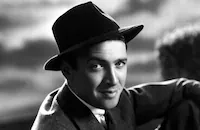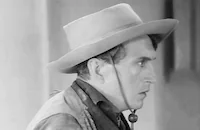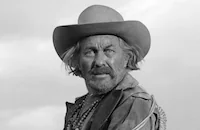Shenandoah

Brief Synopsis
Cast & Crew
Andrew V. Mclaglen
James Stewart
Doug Mcclure
Glenn Corbett
Patrick Wayne
Phillip Alford
Film Details
Technical Specs

Synopsis
Prosperous Virginia farmer Charlie Anderson, who believes that the Civil War is of no concern to him, lives with his six sons, his daughter, his daughter-in-law, and his infant granddaughter. Though they occasionally have to fight off soldiers who want their animals or supplies, they try to remain neutral. His daughter, Jennie, falls in love with and marries Sam, a Confederate officer who is called to duty on their wedding day. Charlie's youngest son, Boy, picks up and wears a discarded Confederate cap, and he is taken prisoner by Union soldiers. Leaving James, James's wife, and their baby behind to watch the farm, the others set out to find Boy and bring him back. Instead, they find Sam in a Union prison camp; and returning to the farm, they find that James and Ann have been murdered by Confederate looters, though the baby has been spared. Then another son, Jacob, is accidentally killed by a Confederate sentry. One Sunday, in the middle of church services, Boy comes limping into church to join his family.

Director

Andrew V. Mclaglen
Cast

James Stewart
Doug Mcclure

Glenn Corbett
Patrick Wayne

Phillip Alford

Katharine Ross
Rosemary Forsyth
Charles Robinson
James Mcmullan
Tim Mcintire
Eugene Jackson Jr.

Paul Fix
Denver Pyle

George Kennedy

James Best

Tom Simcox
Berkeley Harris

Harry Carey Jr.
Kevin Hagen
Dabbs Greer

Strother Martin
Kelly Thordsen
Crew
James Alexander
Robert Arthur
Michael Audley
James Lee Barrett
William Brown
William H. Clothier
Don Cunliffe
Tom Dawson
William Dodds
Hank Edds
Oliver Emert
Jack Geraghty
Larry Germain
Joseph Gershenson
William S. Gilmore Jr.
Alexander Golitzen
D. R. O. Hatswell
Fred Knoth
Olive Koenitz
Otho Lovering
Norman Mayreis
John Mccarthy Jr.
Rolf Miller
Terry Morse Jr.
Edward Muhl
Terence Nelson
Rosemary Odell
Ralph Owen
Frank Parmenter
Luanna Poole
William Reisbord
William Russell
Frank Skinner
Alfred Sweeney
Waldon O. Watson
Bud Westmore
Frank Westmore
Albert Whitlock

Videos
Movie Clip




Trailer
Hosted Intro
Film Details
Technical Specs

Award Nominations
Best Sound
Articles
Shenandoah
Shot on lush, pretty locations near Eugene, Oregon, by director Andrew V. McLaglen, Shenandoah nonetheless has a visual look that resembles television shows of the period. McLaglen's father was Victor McLaglen, a stock actor for John Ford, and the younger McLaglen seems to have inherited Ford's fondness for big, burly action movies - but without the emotional intensity or picture-perfect compositions of the master director. That said, there are two set-pieces in Shenandoah that are particularly well-staged, one involving a cow on a battlefield and the other a shocking rape/murder sequence that uses the power of suggestion rather than explicit detail. McLaglen went on to direct three more features with Stewart, but this was by far the highest-grossing, perhaps partly due to the fact that its antiwar tone touched a chord as America agonized over Vietnam.
Stewart's performance, however, was surely the main reason for Shenandoah's popularity. Grizzled and tough, his teeth perpetually clenched on a cigar stub, Stewart totally dominates the movie. While he is convincing as the strict patriarch who rules his family with a stern hand, his tender side peaks through as well, revealing a soft heart. (He is still, after all, James Stewart!) It's an appealing contrast and in one scene, for example, Stewart advises his new son-in-law (Doug McClure) in the ways of women. "They expect things they never ask for," says Stewart. "And when they don't get them, they ask why. Sometimes they don't ask. And then they just go ahead and punish you for not doing what you didn't know you were supposed to do in the first place."
And only Stewart could pull off, with such poignance and sensitivity, two scenes in which he must speak to his wife's grave. One famous speech well sums up Shenandoah's attitude toward war: "I don't even know what to say to you, Martha. There's nothing much I can tell you about this war. It's like all wars, I suppose. The undertakers are winning it. Politicians talk a lot about the glory of it. The soldiers, they just want to go home." Despite Stewart's fine performance, he didn't receive an Oscar® nomination for Best Actor but the movie did garner an Academy Award nomination for Best Sound.
Producer: Robert Arthur
Director: Andrew V. McLaglen
Screenplay: James Lee Barrett
Cinematography: William H. Clothier
Film Editing: Otho Lovering
Costume Design: Rosemary Odell
Music: Frank Skinner
Cast: James Stewart (Charlie Anderson), Doug McClure (Sam), Glenn Corbett (Jacob Anderson), Patrick Wayne (James Anderson), Rosemary Forsyth (Jennie Anderson), Phillip Alford (Boy Anderson), Katharine Ross (Ann Anderson), Charles Robinson (Nathan Anderson), James Best (Carter), Denver Pyle (Pastor Bjoerling), George Kennedy (Col. Fairchild), Warren Oates (Billy Packer), Strother Martin (Engineer).
C-106m. Closed captioning. Letterboxed.
by Jeremy Arnold

Shenandoah
Quotes
When are you going to take this war seriously, Anderson?- Lieutenant Johnson
Now let me tell you something Johnson, before you get on my wrong side. My corn I take seriously, because it's mine. And my potatoes and tomatoes and my fence I take note of because they're mine. But this war is not mine and I don't take note of it.- Charlie Anderson
I don't even know what to say to you any more, Martha. There's not much I can tell you about this war. It's like all wars, I guess. The undertakers are winning. And the politicians who talk about the glory of it. And the old men who talk about the need of it. And the soldiers, well, they just wanna go home. I guess you're not so lonely any more, with Ann and James and Jacob. And maybe the boy. You didn't know Ann, did you? Well, you'd like her. You'd like her, Martha. Why, she and James are so much alike, they're just like...no...no...we were never that much alike, were we Martha? We just sorta grew alike through the years. But I wish, I wish I could just know what you're thinking about it all, Martha. And maybe it wouldn't seem so bad to me if I knew what you thought about it.- Charlie Anderson
You never give up, do you?- Charlie Anderson
They come closer every day, Pa.- Jacob Anderson
They on our land?- Charlie Anderson
No, sir.- Jacob Anderson
Then it doesn't concern us. Does it?- Charlie Anderson
Lord, we cleared this land. We plowed it, sowed it, and harvest it. We cook the harvest. It wouldn't be here and we wouldn't be eating it if we hadn't done it all ourselves. We worked dog-bone hard for every crumb and morsel, but we thank you Lord just the same for the foos we're about to eat, amen.- Charlie Anderson
Where'd you get the hat, boy?- Charlie Anderson
Down by the creek, sir.- Boy Anderson
Some fella down there handing out hats?- Charlie Anderson
Trivia
The opening battle scenes are taken from Raintree County (1957) and are printed as a mirror image of the original footage. (The same scenes can also be seen in, among other films, How the West Was Won (1962).)
Notes
Location scenes filmed near Eugene, Oregon. Working titles: Fields of Honor and Shenandoah Crossing.

Miscellaneous Notes
Released in United States Winter January 1, 1965
Katherine Ross makes her screen debut.
Released in United States Winter January 1, 1965

















